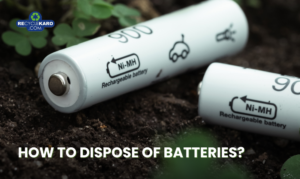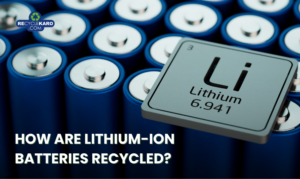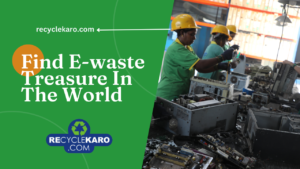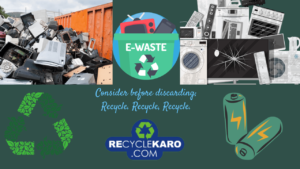How to dispose of batteries?

Disposing of batteries properly is crucial for environmental protection and public health. Batteries contain harmful chemicals that can leach into the soil and water if not disposed of correctly. This blog will guide you through the various types of batteries, their disposal methods, and the importance of responsible battery management.
Understanding Battery Types
Before discussing disposal methods, it’s essential to understand the different types of batteries commonly used:
1. Alkaline Batteries
These are the most common household batteries, used in devices like remote controls, toys, and flashlights. Alkaline batteries are generally safe to dispose of in regular trash in many regions, but battery recycling is encouraged.
2. Nickel-Cadmium (NiCd) Batteries
Often found in rechargeable devices, NiCd batteries contain cadmium, a toxic metal. They should never be thrown in the trash and must be recycled at designated facilities.
3. Nickel-Metal Hydride (NiMH) Batteries
These are also rechargeable batteries and are commonly used in hybrid vehicles and electronics. Like NiCd batteries, they should be recycled rather than discarded.
4. Lithium-Ion Batteries
Found in smartphones, laptops, and electric vehicles, lithium ion batteries can pose fire hazards if damaged or improperly disposed of. They must be recycled at specialized centers.
5. Lead Acid Batteries
Typically used in cars and larger vehicles, lead-acid batteries contain lead and sulfuric acid. They are highly recyclable but must be taken to a recycling facility.
6. Button Cell Batteries
Used in watches, hearing aids, and small electronics, these batteries often contain mercury or lithium. They require special disposal methods to prevent environmental contamination.
Why Proper Disposal Matters
Improper disposal of batteries can lead to severe environmental impacts:
- Soil Contamination: Chemicals from batteries can seep into the ground, affecting plants and wildlife.
- Water Pollution: Battery acids can contaminate groundwater sources.
- Health Risks: Exposure to toxic materials can pose health risks to humans and animals.
- Fire Hazards: Damaged or improperly disposed lithium batteries can catch fire or explode.
Rules Governing The Handling & Disposal of Batteries
The management and disposal of batteries in India are governed by the Environment (Protection) Act of 1986, which provides a framework for addressing not only battery production but also the disposal of battery waste. This led to the establishment of the Batteries (Management and Handling) Rules, 2001, followed by the Battery Waste Management Rules, 2022, both of which apply to manufacturers, importers, recyclers, dealers, and consumers.
Batteries (Management and Handling) Rules, 2001
The Batteries (Management and Handling) Rules, 2001 were the initial regulations overseeing battery handling and disposal in India. These rules specifically targeted the collection and recycling of used lead-acid batteries, aiming to mitigate the environmental impact associated with their disposal.
They mandated that consumers return used batteries, placing the responsibility for collection and transportation onto manufacturers, assemblers, re-conditioners, and importers. These entities were required to establish collection centers and ensure that recyclers processed these batteries to minimize lead contamination in the environment.
Need for Updated Regulations
As battery usage surged across various sectors, including electronics and electric vehicles, stakeholders highlighted the limitations of the 2001 rules, which primarily addressed lead-based batteries. The increasing variety of batteries necessitated a more comprehensive regulatory framework.
In response, the Ministry of Environment, Forests and Climate Change (MoEFCC) introduced the Battery Waste Management Rules, 2022, which expanded the scope to include all types of batteries.
Battery Waste Management Rules, 2022
The Battery Waste Management Rules, 2022 replaced the earlier regulations and now encompass a broader range of batteries such as those used in electric vehicles, automotive applications, and portable devices. Key provisions include:
- Extended Producer Responsibility (EPR): Producers are now responsible for collecting and recycling waste batteries and utilizing recovered materials in new products.
- Prohibition on Landfilling: The rules forbid disposing of batteries in landfills or through incineration.
- Centralized Online Portal: A system for exchanging EPR certificates between producers and recyclers has been established to facilitate compliance.
- Mandatory Recovery Targets: The rules set specific recovery targets for battery materials over time.
- Environmental Compensation: Non-compliance with EPR obligations incurs financial penalties that fund recycling efforts.
The implementation of these rules aims to foster a circular economy by encouraging recycling practices that reduce reliance on new raw materials and promote sustainable business opportunities within the battery management sector.
Disposal Methods by Battery Type
Alkaline Batteries
- Disposal Method: In many areas, alkaline batteries can be disposed of in regular trash due to their low toxicity levels.
- Recycling Options: Check with local waste management for recycling options.
Nickel-Cadmium (NiCd) Batteries
- Disposal Method: Never throw these in the trash.
- Recycling Options: Look for local recycling programs or hazardous waste collection events.
Nickel-Metal Hydride (NiMH) Batteries
- Disposal Method: Similar to NiCd; do not dispose of in regular trash.
- Recycling Options: Many electronics retailers accept these for recycling.
Li-Ion Batteries
- Disposal Method: Do not throw away; they can cause fires if damaged.
- Recycling Options: Use designated e-waste recycling centers or take them to retailers that offer recycling programs.
Lead-Acid Batteries
- Disposal Method: Take them to a recycling facility; they are illegal to throw away. Or as an alternative, you can sell them to retailers that accept and deal with dead or used vehicle batteries or automotive batteries.
- Recycling Options: Most auto parts stores will accept old lead-acid batteries for recycling.
Button Cell Batteries
- Disposal Method: Do not throw these away; they contain hazardous waste materials.
- Recycling Options: Many electronics stores have collection bins or recycling bins for button cell batteries.
Steps for Effective Battery Disposal
1. Segregation
It is essential to separate used batteries from regular household waste. This prevents contamination and ensures that they are handled appropriately.
2. Identify the Type of Battery
Batteries come in various types, including alkaline, lithium-ion, lead-acid, and button batteries. Each type has its own disposal requirements, so identifying the battery type is crucial for proper handling.
3. Avoid Mixing Different Batteries
Different batteries should not be combined, as this can lead to contamination. Proper disposal should take into account the chemical composition of each battery type to facilitate appropriate recycling.
4. Establish Collection Centers
Producers and importers are mandated by regulations to set up collection centers where consumers can drop off used batteries at the end of their life cycle. These centers ensure that batteries are collected for proper disposal.
5. Reuse or Donate
If a battery is still functional, it should not be discarded with dead batteries. Instead, batteries can be recycled or reused in other devices or donated to retailers that accept used batteries for recycling, thereby reducing waste.
6. Proper Storage
Until batteries are disposed of or donated, they should be stored in a cool, dry place away from moisture and heat to prevent leakage and potential hazards.
Challenges faced in the Disposal of batteries
The disposal of batteries in India encounters several significant challenges that hinder effective management. Here are the primary obstacles:
1. Lack of Awareness
A considerable portion of the population lacks understanding of the environmental dangers posed by improper battery disposal. This ignorance often leads to batteries being discarded alongside regular household or solid waste.
2. Insufficient Infrastructure
In many regions, there is inadequate infrastructure for the collection of used or dead batteries. This deficiency makes it difficult for consumers to locate convenient and authorized drop-off points for proper disposal.
3. Remoteness of Certain Areas
Rural and remote areas often lack both collection services for unused batteries and nearby recycling facilities, complicating the disposal process for residents in these locations.
4. Categorization of Batteries
Batteries come in various types, such as alkaline, nickel-cadmium, nickel-metal-hydride, and lithium-ion, each requiring different disposal methods. This complexity can confuse users, particularly those who are illiterate or lack knowledge about battery classification.
5. Consumer Behavior
Many consumers have ingrained habits of discarding batteries with regular trash, making it challenging to encourage a shift towards responsible disposal practices.
6. Enforcement and Compliance
Ensuring that manufacturers, importers, and producers comply with established disposal guidelines poses a challenge. Effective monitoring and enforcement mechanisms are necessary to achieve compliance. Additionally, the absence of incentives and strict penalties can undermine the implementation of these regulations.
Conclusion
Proper battery disposal is essential for protecting our environment and health. By understanding the different types of batteries and their appropriate disposal methods, you can contribute to reducing pollution and conserving resources through recycling.
Always stay informed about local regulations and participate actively in community efforts aimed at responsible battery management. Your actions today can help ensure a cleaner planet for future generations.
FAQs
How do I dispose of batteries in India?
To dispose of batteries in India, you should take them to designated collection centers or recycling facilities. Many retailers have collection boxes, and community recycling events may also be organized. It’s essential not to throw batteries in regular trash as they can be hazardous waste to the environment.
How do I dispose of AA batteries in India?
AA batteries can usually be disposed of at designated recycling centers. While single-use alkaline batteries are less hazardous than rechargeable ones, it is still advisable to recycle them properly to minimize environmental impact. Check for local collection points or retailer drop-off options.
How to dispose of mobile phone batteries?
Mobile phone batteries, particularly lithium-ion types, should not be thrown away in regular waste due to their materials. Instead, take them to authorized e-waste recycling centers or return them to retailers that offer battery recycling services. This ensures safe handling and proper recycling of valuable materials.
How to dispose of computer batteries?
Computer batteries, including lithium-ion and lead-acid types, should be recycled through specialized e-waste disposal services. Look for local recycling facilities or collection events that accept electronic waste, ensuring that these batteries are processed safely and responsibly.
Are mobile phone batteries recyclable?
Yes, mobile phone batteries are recyclable. They contain valuable materials such as lithium, cobalt, and nickel that can be recovered and reused. Recycling helps reduce reliance on new resources and minimizes environmental impact. Ensure you take them to a certified recycling facility for proper processing.




